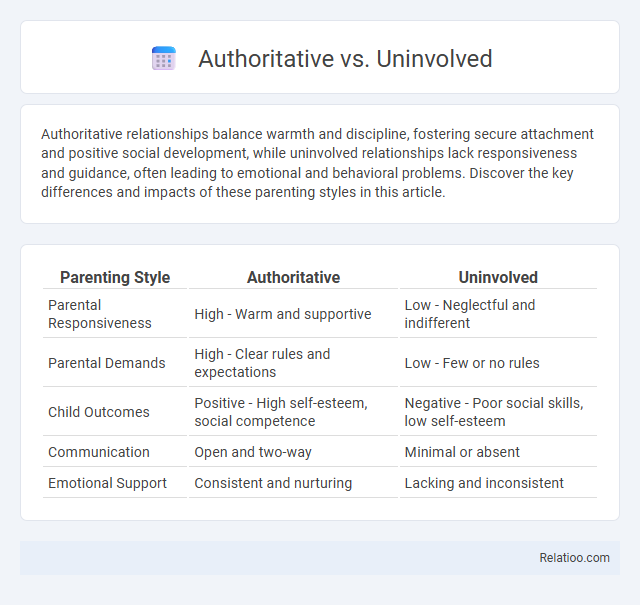Authoritative relationships balance warmth and discipline, fostering secure attachment and positive social development, while uninvolved relationships lack responsiveness and guidance, often leading to emotional and behavioral problems. Discover the key differences and impacts of these parenting styles in this article.
Table of Comparison
| Parenting Style | Authoritative | Uninvolved |
|---|---|---|
| Parental Responsiveness | High - Warm and supportive | Low - Neglectful and indifferent |
| Parental Demands | High - Clear rules and expectations | Low - Few or no rules |
| Child Outcomes | Positive - High self-esteem, social competence | Negative - Poor social skills, low self-esteem |
| Communication | Open and two-way | Minimal or absent |
| Emotional Support | Consistent and nurturing | Lacking and inconsistent |
Understanding Parenting Styles: Authoritative vs Uninvolved
Understanding parenting styles reveals that authoritative parents balance high responsiveness with high demands, fostering emotional regulation and social competence in children. Uninvolved parents exhibit low responsiveness and low demands, often leading to attachment issues and poor academic performance. Research shows children with authoritative parents typically demonstrate greater self-esteem and better behavioral outcomes compared to those with uninvolved caregivers.
Key Characteristics of Authoritative Parenting
Authoritative parenting is characterized by high responsiveness and high demands, striking a balanced approach between warmth and structure. Your child benefits from clear expectations, consistent discipline, and open communication, fostering independence and emotional regulation. Unlike uninvolved parenting, which is marked by neglect and low responsiveness, authoritative parenting promotes social competence and academic success.
Defining the Uninvolved Parenting Approach
The uninvolved parenting approach is characterized by minimal responsiveness and limited demands, often resulting in a lack of emotional support and guidance for children. Your children may experience difficulties in emotional regulation and social competence due to the absence of parental involvement and supervision. Understanding this approach highlights the critical importance of active engagement, as uninvolved parenting contrasts sharply with authoritative styles that balance warmth and structure.
Impact on Child Development: Authoritative vs Uninvolved
Authoritative parenting, characterized by high responsiveness and appropriate discipline, fosters positive child development outcomes such as social competence, self-regulation, and academic success. Uninvolved parenting, marked by low responsiveness and lack of engagement, often leads to developmental challenges including emotional insecurity, poor academic performance, and behavioral problems. The stark contrast in child outcomes highlights the critical role of parental involvement and warmth in nurturing healthy psychological and social development.
Emotional Outcomes for Children
Authoritative parenting fosters positive emotional outcomes by combining warmth and clear boundaries, promoting children's self-esteem and emotional regulation. Uninvolved parenting often leads to negative emotional outcomes such as anxiety, low self-worth, and difficulty forming secure attachments. Your child benefits most emotionally when parents engage with high responsiveness and reasonable control, characteristic of the authoritative style.
Academic Performance and Motivation
Authoritative parenting, characterized by high responsiveness and reasonable demands, consistently correlates with superior academic performance and intrinsic motivation in students. Uninvolved parenting, marked by neglect and lack of engagement, often results in poor academic outcomes and low motivation, negatively impacting Your educational success. The balance of support and expectations found in authoritative parenting fosters a learning environment conducive to better grades and a stronger drive to excel.
Social Skills and Peer Relationships
Authoritative parenting fosters strong social skills and positive peer relationships through consistent support and clear boundaries, promoting empathy and cooperation in Your child. Authoritarian parenting often hinders social development by imposing strict rules without warmth, leading to difficulties in peer interactions and reduced social confidence. Uninvolved parenting typically results in poor social skills and troubled peer relationships, as lack of guidance and emotional connection leaves children ill-equipped to navigate social settings.
Long-Term Psychological Effects
Authoritative parenting, characterized by high responsiveness and firm control, fosters long-term psychological benefits such as increased self-esteem, social competence, and emotional regulation in children. In contrast, uninvolved parenting, marked by neglect and low engagement, often leads to adverse outcomes like poor academic performance, increased behavioral problems, and heightened risk of mental health disorders. Authoritarian parenting, with strict rules and low warmth, is associated with issues like anxiety, lower self-confidence, and difficulties in social relationships over time.
Tips for Transitioning from Uninvolved to Authoritative Parenting
Shifting from uninvolved to authoritative parenting requires establishing consistent routines and actively engaging in your child's daily activities to build trust and communication. Setting clear expectations with supportive guidance fosters a positive environment conducive to healthy development and emotional security. Prioritize empathetic listening and positive reinforcement to encourage cooperation and strengthen the parent-child relationship effectively.
Conclusion: Choosing the Best Parenting Approach
Choosing the best parenting approach depends on your child's needs, personality, and family dynamics. Research highlights that authoritative parenting, characterized by warmth and clear boundaries, consistently fosters better emotional regulation and social competence compared to uninvolved or authoritarian styles. Your commitment to an authoritative approach promotes healthier development and stronger parent-child relationships over time.

Infographic: Authoritative vs Uninvolved
 relatioo.com
relatioo.com